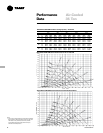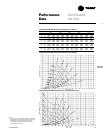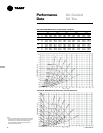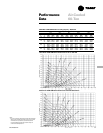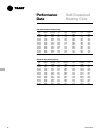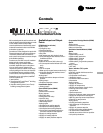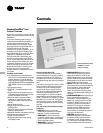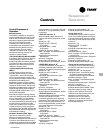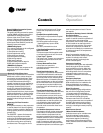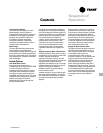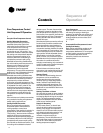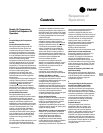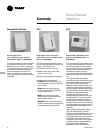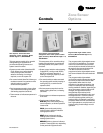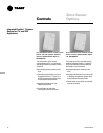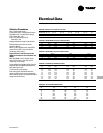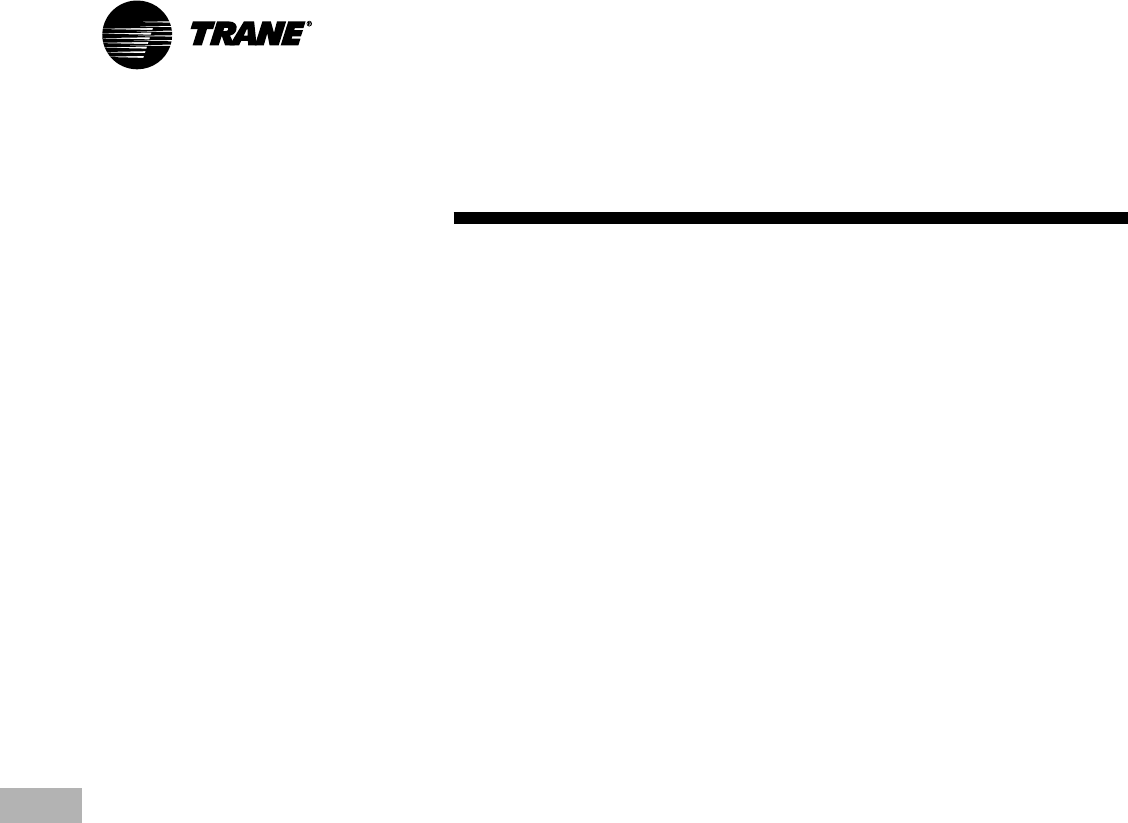
Controls
PKG-PRC002-EN
72
Sequence of
Operation
when the temperature rises 5 F above
the setpoint.
Comparative Enthalpy Control of Airside
Economizer Option
An optional comparative enthalpy
system is used to control the operation of
the economizer and measures the
temperature and humidity of both return
air and outside air to determine which
source has lower enthalpy. This system
allows true comparison of outdoor air
and return air enthalpy by measurement
of outdoor and return air temperatures
and humidities.
Note: If comparative enthalpy is not
ordered, the standard method compares
outdoor air enthalpy with a fixed
reference enthalpy, set through the
human interface panel.
Compressor Lead/Lag
Compressor lead/lag is a user-selectable
feature through the human interface
panel available on all units. After each
request for compressor operation, the
lead refrigeration circuit or compressor
switches, thereby causing a more
equitable or balanced run time among
compressors.
Emergency Stop Input
A binary input is provided on the unit’s
RTM module board for installation of a
field-provided switch or contacts to
immediatly shutdown all unit functions.
Water Flow Control
With compatible piping configurations,
the unit can be configured to provide:
1) Constant water flow with basic or
intermediate piping or 2) Variable water
flow with intermediate piping only.
Constant water flow is for condenser
pumping systems that are not capable of
unloading the water-pumping system.
Variable water flow maximizes energy
saving by unloading the water pumping
system.
Head Pressure Control
• Water-Cooled Condensers
Units that are set up for variable water
flow will modulate a water valve to
maintain a user-defined condensing
temperature setpoint. Condensing
temperature will be referenced utilizing
factory installed sensors located at each
condenser.
Generic Building Automation System
Module (GBAS) Option
The generic building automation system
module (GBAS) provides broad control
capabilities for building automation
systems other than Trane’s Tracer
®
system. A field provided potentiometer
or a 0-5 vdc signal can be applied to any
of the inputs of the GBAS to provide the
following inputs and outputs.
• GBAS Analog Inputs
Four analog inputs that can be configured
to be any of the following:
(1) Occupied zone cooling
(2) Unoccupied zone cooling
(3) Occupied zone heating
(4) Unoccupied zone heating
(5) SA cooling setpoint
(6) SA heating setpoint
(7) Space static pressure setpoint
(8) SA static pressure setpoint
• GBAS Binary Outputs
Each of the five (5) relay outputs can be
mapped to any/all of the available
diagnostics.
• Demand Limiting Binary Input
This function is operational on units with a
GBAS and is used to reduce electrical
consumption at peak load times. There
are two types of demand limiting, 50%
and 100%. When demand limiting is
needed, mechanical cooling and heating
operation are either partially (50%), or
completely disabled (100%) to save
energy. The demand limit definition is
user definable at the human interface
panel. Demand limit binary input accepts
a field supplied switch or contact closure.
When the need for demand limiting has
been discontinued, the unit’s cooling/
heating functions will again become fully
enabled.
Evaporator Coil Frost Protection
FROSTAT
™
A temperature sensor on the evaporator
is used to determine if the coil is getting
close to a freezing condition. Mechanical
cooling capacity is shed as necessary to
prevent icing.
The FROSTAT
™
system eliminates the
need for hot gas bypass and adds a
suction line surface temperature sensor
mounted near the TXV bulb location to
shut off the cooling when coil frosting
conditions occur. The supply fan is not
shut off and will de-ice the coil. Timers
prevent the compressors from rapid
cycling.
Occupied/Unoccupied Switching
There are four ways to switch occupied/
unoccupied:
(1) Programmable night setback sensor
(2) Field-supplied contact closure
(hardwired binary input to RTM)
(3) Tracer
®
(4) Factory-mounted time clock
• Field Supplied Occupied/Unoccupied
input on the RTM
This input accepts a field supplied switch
or contacts closure such as a time clock.
• Trane Tracer
®
System
The Trane Tracer
®
system can control the
occupied/unoccupied status of the self-
contained unit.
• Factory Mounted Time Clock
A time clock can control the
occupied/unoccupied status of the
self-contained unit.
Timed Override Activation - ICS
This function is operational whenever the
unit’s RTM module board is used as the
zone temperature sensor source, which
can be set at the human interface panel.
When this function is initiated by the push
of the override button on the zone sensor,
the unit will switch to the occupied mode.
Unit operation (occupied mode) during
timed override is terminated by a signal
from Tracer
®
.
Timed Override Activation - Non-ICS
This function is active whenever the unit’s
RTM module board is selected as the
zone temperature source, which can be
set at the human interface panel. When
this function is initiated by the push of the
override button on the zone sensor, the
unit will switch to the occupied mode.
Automatic cancellation of the timed
override mode occurs after three hours
of operation.
Low Ambient Compressor Lockout
This function will lock out the compressor
if the outdoor air temperature is below
the low ambient compressor lock-out
temperature setpoint when using a field-
installed outside air sensor. This setpoint
is adjustable at the human interface
panel. Compressors will lock out when
outdoor air temperature falls below that
selected temperature and will start again



